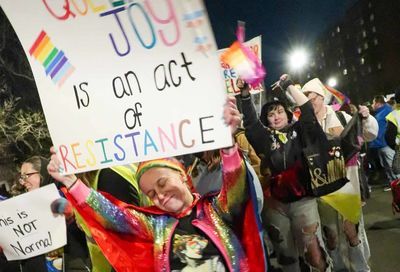Nepal is First South Asian Country to Register a Same-Sex Marriage
Maya Gurung and Surendra Pandley’s marriage was officially registered with the government of Nepal in late 2023.

A battle six years in the making was finally won as Maya Gurung and Surendra Pandley’s marriage was officially registered with the government of Nepal in late 2023.
Maya, a transgender woman, and Surendra have been living as a married couple since 2017. The ceremony, however, was never recognized by the government.
While Nepal became the first country in the world to allow residents to change their gender identity from M or F to a third option, O (for “other”), on a federal census in 2011, the country still did not have the legal framework to register same-sex marriages.
The couple’s traditional Hindu ceremony in 2017 occurred during a new wave of sweeping legalizations across the globe for same-sex marriages.
However, the implications of their legal fight can be traced back to at least 2007. Sixteen years ago, Nepal’s Supreme Court ordered the government to start making preparations to create a law to legalize same-sex marriage. Cue the committee formation.
Another seven years passed before the committee formally recommended, in 2015, that the government grant legal recognition to same-sex marriages based on the principle of equality.
That same year, Nepal adopted its new constitution, which forbade discrimination based on sexual orientation and gender identity. According to the global rights organization Human Rights Watch, the Nepalese government subsequently identified over 100 laws that would need to be changed to eliminate discrimination against LGBTQ people. This prompted same-sex couples to begin mounting legal battles in an effort to force the government to amend those laws.
In 2017, another couple set a legal precedent, seemingly right under the noses of the government, with the American wife of a Nepalese woman being granted a non-tourist visa.
While the government language defined marriage as one between a man and woman, the court intervened in the case, writing in its ruling: “If a foreign national claiming to be married to a Nepali citizen submits a marriage registration certificate, and the Nepali citizen confirms the marriage in their visa application, then the foreign national should not be denied a visa.”
A third couple soon brought their own challenge against the law. Adheep Pokhrel and Tobias Volz had wed in Germany where, in 2018, same-sex marriage was legal. But Tobias was denied a non-tourist visa to return to Adheep’s home country. The couple cited the ruling from the 2017 case, as well as the 2007 Supreme Court order, to advance their efforts for recognition with government authorities.
In July 2023, these cases prompted the country’s Supreme Court to institute interim orders allowing LGBTQ couples to register their marriages as government officials prepare actual changes to the civil code legalizing same-sex marriage, and confusion ensues. Officials in the country claimed a lack of clear instructions was keeping them from being able to follow this new order correctly.
The Home Ministry has since made new changes to its regulations, clarifying the government’s directions. The development allowed Maya and Surendra to have their marriage officially recognized.
“We got this historic achievement, and finally Maya and Surendra got their marriage registered at the local administration office,” Sunil Babu Pant, a gay former parliamentarian and LGBTQ activist, said, according to LGBTQ Nation.
Pinky, the president of the Blue Diamond Society, which advocates on behalf of sexual and gender minorities in Nepal, told the New Indian Express that the official recognition of same-sex marriages — particularly Maya and Surendra’s, involving a trans woman, is a great achievement for those belonging to the third gender community of Nepal, who may now pursue their own efforts to have their marriages legally recognized.
“There are many third-gender couples living without their identities and rights,” Pinky said, “and this is going to help them a lot.”
Support Metro Weekly’s Journalism
These are challenging times for news organizations. And yet it’s crucial we stay active and provide vital resources and information to both our local readers and the world. So won’t you please take a moment and consider supporting Metro Weekly with a membership? For as little as $5 a month, you can help ensure Metro Weekly magazine and MetroWeekly.com remain free, viable resources as we provide the best, most diverse, culturally-resonant LGBTQ coverage in both the D.C. region and around the world. Memberships come with exclusive perks and discounts, your own personal digital delivery of each week’s magazine (and an archive), access to our Member's Lounge when it launches this fall, and exclusive members-only items like Metro Weekly Membership Mugs and Tote Bags! Check out all our membership levels here and please join us today!
























You must be logged in to post a comment.